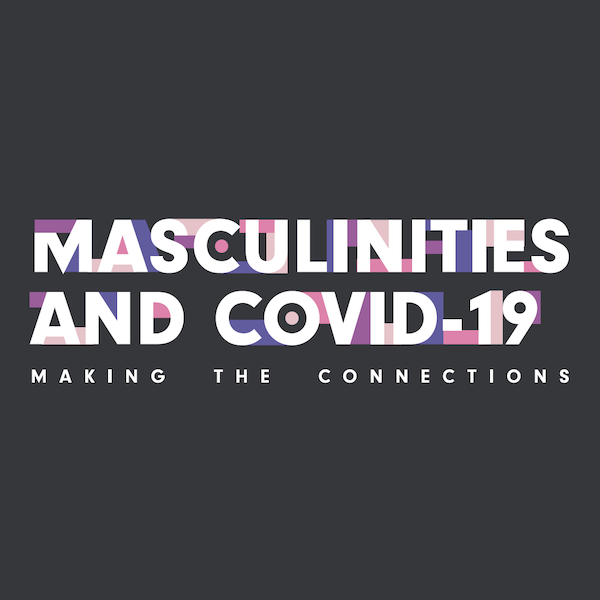The COVID-19 pandemic is having far-reaching impacts on every aspect of society in countries across the world, making clear the importance of applying a gendered – and in this case, a masculinities – lens to the pandemic’s impact.
Based on critical masculinity theory and an extensive review of publications ranging from newspaper articles to academic research, this new report Masculinities and COVID-19: Making the Connections reveals a number of important linkages among men, masculinities, and the impacts of COVID-19.
The report explores topics including: how men are navigating health issues such as risk, trauma, grief, and loneliness; what the gendered effects of the pandemic are on livelihoods, care, and relationships at home (including on men’s use of violence); and how particular forms of “masculinist” leadership – emphasizing dominance rather than cooperation – exacerbate conflict and undermine human rights. The report also sets out principles and recommendations for policymakers and other decision-makers to take masculinities into account in response to the crisis.
The report finds that:
- While there is a similar distribution of COVID-19 cases between men and women, men represent a higher proportion of global deaths (58%, according to the World Health Organization), due to a range of biological and social factors. Because of masculine norms that encourage stoicism, toughness, and self-reliance, men may be less likely to seek help for COVID-19 symptoms or to take seriously measures to prevent its spread (like handwashing and wearing masks).
- Lockdowns have exacerbated and demonstrated the pervasiveness of men’s violence in the home, as well as online sexual harassment and abuse, highlighting the urgent need to engage men and boys to prevent and end this violence.
- School and nursery closures have put extra strain on parents, particularly women, to perform care work and schooling at home, and while many men have been more involved at home, significant disparities in men’s overall contribution to care remain. This strain is sometimes being compounded by the care of ill or older individuals, who are also predominantly cared for by women.
- The emerging global recession, which in some cases may have been exacerbated by “masculinist” leadership which has failed to respond effectively to COVID-19, is likely to trigger widespread poverty and food insecurity, with women more likely to lose their jobs than men. However, government plans and policies appear – as in the 2008 financial crisis – to be prioritizing industries which tend to employ more men, such as manufacturing and construction, rather than investing in “social infrastructure” such as care and health, where women predominate.
- The influence of masculinist perspectives has hampered government responses to coronavirus, encouraging dismissiveness based on notions of being “too tough” to need to worry about it and the use of warlike rhetoric in framing the pandemic. Some national leaders have also used COVID-19 and public health measures as an excuse to increase state power and repression, empowering male-dominated, militarized police, and security forces to exercise authority and maintain order.
The report provides a number of recommendations aimed at policymakers and other decision-makers to prevent violence and advance gender equality during the COVID-19 pandemic and beyond. These include:
- Collect and publish sex-disaggregated data – also broken down by factors such as age, race, ethnicity, socioeconomic status, disability, gender identity, and sexual orientation – about the impacts of COVID-19 on health and social issues.
- Actively engage men and boys through healthcare services, and work to transform harmful masculine norms related to caring for their physical and mental health.
- Support gender-based violence services and women’s organizations and ensure they are well funded during and after the pandemic.
- Address the roots of violence through investment in evidence-based perpetrator programs and other initiatives to change the behavior of men who use violence, together with gender-transformative primary prevention campaigns.
- Value care as a foundation of the economy, society, and environmental sustainability by promoting a cultural shift led by governments, employers, trade unions, education, civil society, and media. Transform men’s involvement in care in the long-term through cross-departmental government-led strategies to engage fathers and other male caregivers and shift gender norms.
- Conduct gender analysis of economic initiatives to ensure that stimulus and recovery packages are designed, assessed, and tracked for their impact on gender and other equalities issues.
- Ensure men in government, business, trade unions, non-governmental organizations, and beyond proactively support gender equality and encourage other men to play their part.
- Listen to women’s voices and reflect their day-to-day experiences and needs in policy and practice. This includes advocating for women’s equal representation in decision-making bodies and processes responding to the pandemic.
- Model preventive health behaviors; this should be done in particular by political and community leaders (especially men), and includes following public health measures such as social distancing and mask-wearing, to challenge the idea that doing so is emasculating.
- Change organizational cultures through developing innovative programs to challenge and transform the social norms that underpin militarism and masculinities in state institutions, and by fostering nonconfrontational and de-escalating approaches to conflict.
Read the full report here.
Read other papers in the “Making the Connections” series:

